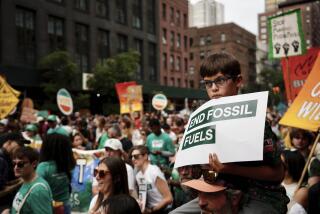Environment prize goes to Indian activist who battled coal mine plan
Reporting from Mumbai, India — Ramesh Agrawal had just finished lunch when two men walked into his cyber cafe and inquired about computer prices. Agrawal said he would ask his sons, who run the business. That’s when one of the men shot him.
Two bullets pierced Agrawal’s groin and left thigh, shattering his femur. Blood ran down his pant leg. He collapsed but managed to grab a phone to call his wife for help.
The assailants, who sped off on a motorbike, had links to a powerful steel company seeking to build a coal mine in Agrawal’s home state of Chhattisgarh, in eastern India, police said. Agrawal had been the mine’s foremost opponent, using India’s nascent freedom-of-information laws to lead a grass-roots campaign that prompted authorities to cancel the project’s environmental clearance.
The July 2012 shooting badly wounded Agrawal, now 58, who still wears a cast on his upper leg and cannot walk without a cane. But for his activist efforts, Agrawal on Monday will receive the Goldman Environmental Prize, the world’s largest award for grass-roots environmental activists, at a ceremony in San Francisco.
The award for Agrawal — one of six recipients of the annual prize, which comes with $175,000 in cash each — highlights the risks faced by Indian campaigners who have tried to challenge powerful business interests. The company that Agrawal opposed, Jindal Steel & Power, is one of the country’s largest energy firms and is led by multibillionaire Naveen Jindal, a two-term member of Parliament from the ruling Congress Party.
Agrawal challenged Jindal’s coal project after seeing the harmful effects of rapid industrialization in his state, home to nearly one-fifth of the country’s coal reserves. India’s surging economy has created a yawning demand for domestic coal, the country’s primary fossil fuel. New mines and power plants have overtaken vast tracts of forest and farmland, transforming agrarian Chhattisgarh into one of India’s fastest-growing states.
Environmentalists say that the breakneck expansion has worsened air and water quality, pushed poor villagers off their land and produced industrial runoff that threatens small farms. A recent Greenpeace report blamed air pollution from India’s coal power plants for 120,000 premature deaths and 20 million new cases of asthma each year.
Activists complain that industrialists are cozy with government officials, who rubber-stamp massive new projects without regard for the environmental and public health costs.
“We are a rich state; we have minerals, natural resources, everything we have here,” Agrawal said in a recent interview from his Internet cafe in the industrial boomtown of Raigarh. “This would be the happiest state in the country except for corruption.”
Agrawal was an early believer in the power of the Internet; his cyber cafe, opened in 1999, was Raigarh’s first. A father of three, he was involved in village literacy programs before starting his own nongovernmental organization, the Jan Chetana people’s movement, in 2005.
The same year, India passed a Right to Information Act that aimed to improve the accountability of government agencies. Using the cyber cafe as an office, Agrawal fired off a flurry of information requests on local coal and steel projects and found that many had failed to conduct mandatory environmental impact assessments or may have broken other laws.
In meetings in the surrounding villages, illiterate farmers complained to him that company representatives had tricked them into signing over farmland for cut-rate sums.
“The villagers didn’t know how to go about opposing business,” Agrawal said. “We united people and showed that if you want to oppose such bigwigs, you have to join together. You can’t fight them on your own.”
In 2007, Agrawal learned that Jindal Steel, which already operated several private coal mines in the area, was planning to develop a 4-million-ton-per-year mine in Raigarh. By law, the company had to conduct a public hearing on the project, but Agrawal said such meetings usually were a farce — held in private, with some residents plied with cash or a free meal to ensure their support.
Agrawal brought concerned villagers to the meeting, where they clashed with pro-Jindal residents in a chaotic, chair-throwing melee. Police were called in and many of Agrawal’s supporters were beaten or arrested. The hearing continued without them and the project eventually won government approval. Agrawal was accused of defamation, landing him in jail for 2 1/2 months.
Undaunted, Agrawal fought the mine project all the way to the National Green Tribunal, a special court established in 2010 to handle environmental cases. In April 2012, the court withdrew the project’s environmental clearance, declaring that the public hearing conducted by authorities was a “mockery.”
Three months later, the gunmen arrived at Agrawal’s cyber cafe. He underwent multiple operations in the state capital and in Mumbai to remove the bullets. Nearly two years later, seven metal rods still hold his thigh in place, confining him to his home and the cyber cafe on most days.
Police arrested a Jindal Steel security guard and three associates in the shooting, and later two Jindal security officers surrendered to local authorities. The case is pending.
A company spokeswoman, Indira Das, denied that Jindal Steel had any involvement in the “alleged incident of shooting.”
“All the allegations of Mr. Ramesh Agrawal against JSPL and/or its management are wrong, manipulated and baseless,” Das said.
Although the Right to Information Act has increased transparency, it has also made targets of activists, who must file requests under their own names. Scores of petitioners have been attacked and several have been killed.
Despite the risks — and his serious injuries — Agrawal has continued to file information requests on behalf of other impoverished communities and has successfully blocked several other coal and power projects on legal grounds.
“It’s not that Raigarh is different from other places,” said Ritwick Dutta, an environmental lawyer who is representing Agrawal in more than a dozen cases. “The difference is that they have someone who is willing to raise their voice and face the consequences, and that is Ramesh.”
The other winners of the 2014 Goldman prize are South African environmentalist Desmond D’Sa, Russian zoologist Suren Gazaryan, Indonesian biologist Rudi Putra, Peruvian indigenous activist Ruth Buendia and New York anti-fracking lawyer Helen Slottje.
More to Read
Sign up for Essential California
The most important California stories and recommendations in your inbox every morning.
You may occasionally receive promotional content from the Los Angeles Times.











